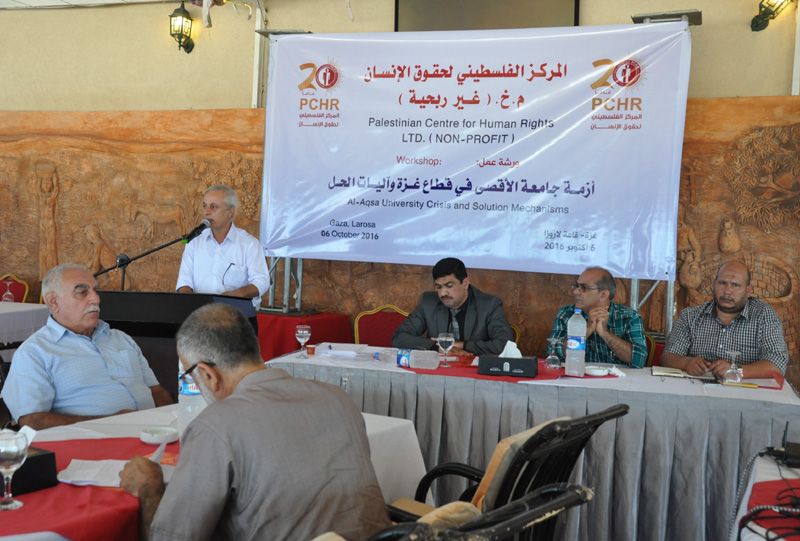
Ref:37-2016
On Thursday, 06 October 2016, the Palestinian Center for Human Rights (PCHR) organized a workshop titled “Al-Aqsa University Crisis in the Gaza Strip and Solution Mechanisms“. The workshop aimed to discuss the developments relating to al-Aqsa University crisis in the Gaza Strip and looking for an appropriate mechanism to end the crisis. The workshop was held in coincidence with the aggravating crisis and its negative impacts on the students, including their right to education. A group of specialists from the Ministry of Higher Education; al-Aqsa administrative and academic staff; educational experts; representatives of CBOs; representatives of political parties and public figures participated in the workshop. Moreover, a number of students from al-Aqsa University and other universities participated in the workshop as well.
During the workshop, Dr. Kamal al-Shrafi, Director of al-Aqsa University Board of Trustees, presented an paper titled as “Al-Aqsa University Crisis and the Ministry of Higher Education’s Vision”. He said that al-Aqsa University’s crisis has gone through three stages, the third of which (the current) was the most serious one because of the reactions between the two parties, due to which the University Council was not convened; salaries of a number of academics and administrative staff members were suspended; and the University students were deprived of their right to education. All of this resulted in disrupting the educational process in the University. Al-Shrafi also stated that they reached previously an agreement to solve the university crisis titled “al-Aqsa Declaration”. The agreement consists of 12 items that could have solved the crisis, but some parties to the agreement retreated, therefore, the agreement became invalid and the crisis was aggravated. Furthermore, al-Shrafi emphasized all the university disputed issues could have been solved if all efforts were unified together. He added that these solutions included a unified reference to the university administration, which is the Ministry of Higher Education; commitment to the law and University bylaw; and pushing political bickering away from the educational process.
Dr. Ayman al-Yazouri, Undersecretary of Higher Education Affairs in Gaza, presented a paper on “The Ministry of Higher Education’s Vision in Gaza related to al-Aqsa University Crisis”. He said the crisis had directly affected 23,000 students as well as their rights to get a high level of education with low prices. Al-Yazouri pointed out the crisis entered a critical stage when disputes started to appear to the surface, especially when students were warned against joining the university and their certificates would not accredited. Furthermore, al- Yazouri emphasized that any solution for crisis should include specific points as follows: the university reference should be the Ministry of Higher Education in Gaza; correcting the status of all employees in the university who were assigned after 2009; stopping all forms of threats against students that their certificates would not be accredited; and stopping the salary suspension for some employees.
Dr. Mohammed al-Emour, Coordinator of the Union of Palestinian Public Universities, gave a presentation on “The Union of Palestinian Public Universities’ Vision”. He said that the crisis was based on the lack of commitment to the law regulating work of the higher education and the attitude of the Ministry of Education in Gaza as an independent ministry without taking into account its powers within that law regarding its relationship with the Education Ministry in the West Bank. Dr. al-Emour confirmed the crisis would not be fixed unless there was respect for the university reference represented by the Ministry of Education; commitment to rules regulating the governmental higher education; enabling the Board of Trustees in to practice its powers guaranteed by the law; ending the students’ and employees’ suffering resulting from the political split; and correcting the status of the university staff according to the university needs as well as the rules of civil service and General Personnel in Ramallah.
Moreover, Dr. Bassam Abu Hashish, head of the Democratic Coalition of al-Aqsa University Staff, presented a paper on “Mechanism to Overcome the Crisis” in which he stressed the need to consider the university as a self-standing body, push political bickering away from it, unify the university financial accounts and transfer it to a bank that works under the supervision of the Palestinian Monetary Authority, enable the university Board of Trustees to assume it duties, agree on the University president with the necessary scientific and professional qualifications, end the unfair measures against the university staff, release the suspended salaries, find a solution regarding the financial dues file of the university staff which had been suspended since 2013, and end resolutions and threats relevant to not accrediting the university certifications.
Khalil Shaheen, Director of PCHR’s Economic and Social Rights Unit, issued a position paper titled, “Al-Aqsa University Crisis in the Gaza Strip”, which addresses the developments relevant to the crisis in the university and measures taken by both Ministries of Education in Ramallah and the Gaza Strip. Shaheen emphasized that PCHR is interested in finding a solution for the crisis taking into consideration the international standards and Palestinian laws relevant to the right to education; the recommendations mentioned in the position paper, including giving legal powers to the Ministry of Education in Ramallah to supervise the university; according to the Council of Ministers’ decision no. 4/2009 related to the Palestinian governmental universities bylaw; in addition to finding a solution for the academic and administrative staff problems away from the political quota which would restore confidence in the leadership role of universities in preparing and graduating cadres that would contribute to building a Palestinian free society.
After discussing points of view and suggestions that would contribute to solving al-Aqsa University crisis, the participants agreed on the importance of finding solutions for the crisis as fast as possible so that students would be able to continue their education and the staff assume their duties.
… [Trackback]
[…] Read More on to that Topic: pchrgaza.org/in-view-of-the-aggravating-crisis-pchr-organizes-workshop-on-al-aqsa-university-crisis/ […]